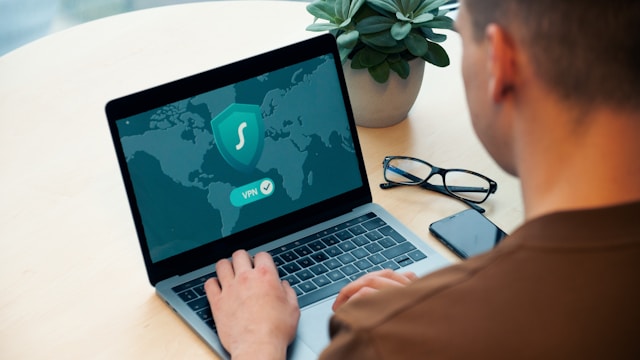As our lives become increasingly digital, concerns around online privacy, security, and freedom continue to grow. From personal data tracking to regional content restrictions and public Wi-Fi vulnerabilities, the modern internet can be a risky place to navigate unprotected.
So, how can you browse safely, keep your information private, and access the content you need from anywhere in the world? One powerful tool to help with this is a VPN.
In this article, we’ll explain what a VPN is, how it works, and why using one is becoming a must for everyday internet users not just tech experts.
What Is a VPN?
VPN stands for Virtual Private Network. In simple terms, a VPN is a service that creates a secure, encrypted connection between your device and the internet.
When you use a VPN, your internet traffic is routed through a remote server operated by the VPN provider. This process hides your real IP address and encrypts all the data you send and receive. It’s like creating a private tunnel through the internet that keeps your information safe from prying eyes.
A VPN can be used on almost any internet-connected device, including laptops, smartphones, tablets, and even smart TVs or routers. Whether you’re working from home, streaming a show, or using public Wi-Fi at a coffee shop, a VPN helps protect your data and maintain your privacy.
Why Should You Use a VPN?
Understanding why use a VPN is important starts with knowing what it protects you from. There are several key reasons more people are using VPNs today than ever before.
1. Protect Your Privacy
Every time you browse the internet, your Internet Service Provider (ISP) can see which websites you visit, how long you stay, and what you do online. That data can be logged, sold to advertisers, or handed over to authorities. A VPN prevents your ISP and other third parties from seeing your online activity by encrypting your connection and hiding your IP address.
2. Secure Your Data on Public Wi-Fi
Public Wi-Fi networks (like those in cafes, airports, and hotels) are notoriously unsafe. Hackers can easily intercept unprotected data on these networks, stealing personal information like login credentials, banking details, or emails. A VPN adds a strong layer of encryption, making your connection secure even on unsecured Wi-Fi.
3. Access Geo-Restricted Content
One of the most popular benefits of VPN use is its ability to bypass geo-restrictions. Many streaming services, websites, and apps offer different content depending on your location. With a VPN, you can connect to a server in another country and access content as if you were physically there perfect for unlocking global libraries on platforms like Netflix, Hulu, or BBC iPlayer.
4. Avoid Censorship
In some countries, internet access is heavily restricted by governments. VPNs allow users to get around censorship and access blocked websites, apps, and social platforms. This is especially valuable for journalists, activists, or anyone living under restrictive regimes who needs uncensored access to information.
5. Prevent Price Discrimination
Did you know that some websites show different prices based on your location or browsing history? This is common with flight bookings, hotel reservations, and car rentals. By using a VPN, you can shop from different “locations” and potentially find better deals by avoiding regional price discrimination.
When Should You Use a VPN?
While it’s smart to use a VPN regularly, there are specific situations where it’s especially helpful:
-
While traveling: Access your favorite content or services while abroad, and protect your data on public Wi-Fi.
-
When working remotely: Ensure confidential work communications stay private, especially when accessing company systems.
-
When torrenting or downloading files: Hide your IP address and keep your activity private.
-
While online banking: Add an extra layer of security when accessing financial accounts.
-
When concerned about surveillance: Whether it’s from ISPs, advertisers, or governments, a VPN keeps your online behavior hidden.
Are VPNs Legal and Safe?
Are VPNs legal?
Yes, in most countries, using a VPN is perfectly legal. However, a few countries (like China, Russia, Iran, and North Korea) have banned or restricted VPN usage. Always check local laws before using one abroad.
Are VPNs safe to use?
VPNs are safe as long as you choose a reputable provider. The key is to avoid free VPNs that may log your data, sell it to advertisers, or lack strong encryption.
Look for VPN services that offer:
-
A no-logs policy (they don’t store your browsing data)
-
Strong encryption standards (like AES-256)
-
Kill switches (to prevent data leaks if the connection drops)
-
Multi-device compatibility
-
Transparent privacy policies
Paid VPN services often come with customer support, better speeds, and stronger security features compared to free options.
How to Choose the Right VPN
With so many options out there, choosing the right VPN can feel overwhelming. Here’s what to look for:
-
Speed: A good VPN should offer fast connection speeds, especially if you stream, game, or video call.
-
Server locations: More servers in more countries mean better access to global content.
-
Security features: Look for features like 256-bit encryption, DNS leak protection, and a kill switch.
-
Privacy: A strict no-logs policy ensures your activity isn’t tracked or stored.
-
Ease of use: The app should be simple to install and use across all your devices.
-
Customer support: Reliable support is helpful if you run into issues.
Some well-known VPN providers that meet these criteria include NordVPN, ExpressVPN, Surfshark, and ProtonVPN but always do your own research before choosing.
Conclusion
In today’s connected world, protecting your online privacy and accessing the full internet experience is more important than ever. Now that you understand what is a VPN and why should you use one, it’s clear that a VPN isn’t just for tech-savvy users or corporate networks it’s for anyone who values security, freedom, and peace of mind online.

